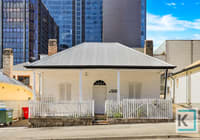
The US rentals giant with a plan for 10,000 student beds
US funds giant Greystar plans to more than double its newly acquired student accommodation holdings in Australia within two years, after taking over a $1.6 billion, 4084-bed portfolio.
That acquisition last year, from Singaporean sovereign wealth fund GIC, has now been bedded down, with Greystar rolling out its new student accommodation platform, Accolade, this month.
It has now set its sights on establishing a 10,000-bed portfolio under its management by 2027.
As ambitious as that target looks, it would still be just a fraction of the 100,000 student beds Greystar has under its control worldwide. Globally, the South Carolina-based operator already has around 1 million rental accommodation units of various forms under management.
The next step towards that goal is already being considered as it works on a bid for the portfolio managed by one of Australia’s largest operators of student accommodation, UniLodge.
Bernadette Chai, managing director of APAC investments at Greystar, said the US giant, which has one of the larger build-to-rent portfolios in this country, is just “at the start” of its journey to be “one of the biggest and best student accommodation providers in the country”.
“We’ve always invested in it globally and this is a great time to get into the sector,” she told The Australian Financial Review.
A big driver for its interest in the sector here is the combination of Australia’s own investment in higher education for foreign students, the sector’s strong reputation and, crucially, the relatively low supply of purpose-built student accommodation.
Compared with other international student markets, such as the US and UK, Australia’s PBSA sector has a relatively low provision, or penetration, rate.
Nearly one in three students studying at Australian universities is an international student. Yet, there is around just one PBSA bed for every 15 students, according to a recent CBRE analysis.
That rate represents a relative scarcity of beds compared with the much higher provision of PBSA beds in the UK and US markets where the ratio is as high as one bed for every two or three students.
“The Australian housing market in terms of student accommodation has one of the best dynamics anywhere globally,” Chai said.
“In terms of the provision rate, currently, we sit behind the other major markets, like the UK and the US. So we think it’s an opportunity.”
The five biggest players – UniLodge, Scape, Iglu, Campus Living Villages, and Greystar – account for 80 per cent of what supply there is.
Another key factor at play is the role of federal government decision-making in the sensitive area of immigration policy and its previous threats to apply caps to reduce the number of foreign students.
The pendulum is swinging in favour of the major PBSA players, including Greystar, with the university sector granted an extra 25,000 overseas student places in 2026, even though the number of applicants in 2025 is unlikely to reach the current cap of 270,000.
That debate was playing out as Greystar locked in its acquisition of the GIC portfolio. But, as Chai points out, while Greystar was alert to that, the policy uncertainty was more than offset by the underlying low supply of PBSA beds here.
“How we got comfortable with the investment, with that background of [policy] uncertainty still present, was the provision rate. It is such a low provision rate compared to the established markets,” she said.
Greystar’s GIC acquisition is backed by a regional fund with institutional investors ranging across the US, the Middle East and Asia.
As it eyes its 10,000 bed target, M&A will be in the mix, as well as fund-through-style investment in developments. Taking over the management of third-party student accommodation assets is also high on its agenda.
UniLodge’s 38,000-bed portfolio is managed on behalf of third parties. While Chai can’t comment directly on that mooted deal, she is happy to note that Greystar has worked closely with UniLodge on the handover of the GIC portfolio, whose properties it manages.
About 70 new staff have joined Greystar as part of the transition, taking its headcount to around 120, including those already working on its build-to-rent portfolio.
“We’re probably going to double that [total] at the very least in the next two years,” Chai said.











